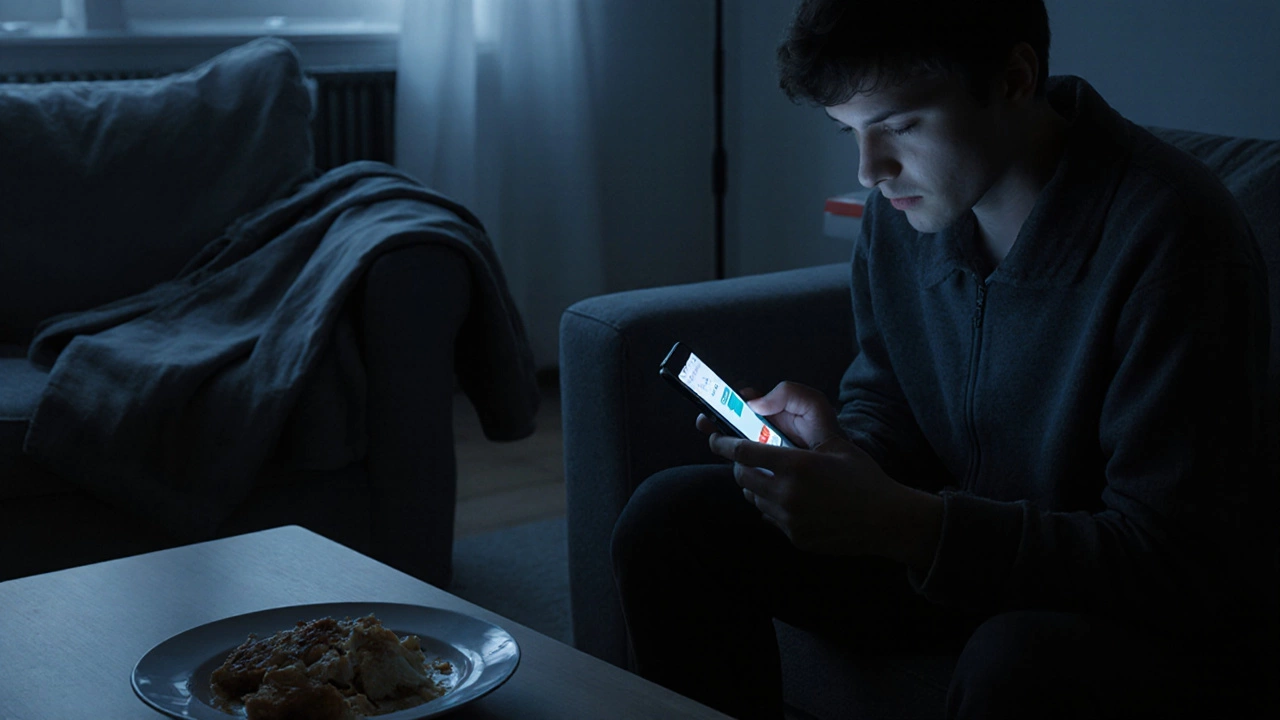How to Tell If Someone Is Mentally Ill: Signs to Watch For
 Nov, 25 2025
Nov, 25 2025
Mental Health Observation Checker
How to Use This Tool
Important: This tool helps identify patterns that may indicate mental health concerns. It is NOT a diagnosis. Your role is to observe patterns and encourage professional support.
Based on the article: "People don't walk around with signs saying they're struggling. Mental illness often shows up as a departure from normal behavior."
Select Observed Signs
Check signs you've noticed in someone you care about. Select at least 3 signs for meaningful results.
What to Do Next
Select at least 3 signs to see recommended actions.
Immediate Help in the UK:
- NHS 111: Call 111 for 24/7 advice on mental health crises
- Mind: Visit mind.org.uk or call 0300 123 3393
- Samaritans: Call 116 123 anytime for confidential support
People don’t walk around with signs saying they’re struggling. Mental illness doesn’t always look like someone crying in a corner or screaming at the sky. More often, it hides in silence - in a friend who stopped answering texts, a coworker who’s suddenly always tired, or a family member who’s lost interest in their favorite food. If you’re wondering whether someone you care about might be mentally ill, you’re not alone. And you’re not supposed to diagnose them. But you can notice the patterns that signal something’s off - and that’s where help begins.
Changes in Behavior Are the First Clue
People don’t change overnight unless something’s broken. If someone who used to laugh at your dumb jokes now sits quietly at dinner, that’s a red flag. If they used to go out every weekend and now haven’t left the house in three weeks, that’s not just being introverted - it’s a shift. Mental illness often shows up as a departure from normal behavior. Not every quiet day means depression. But a pattern? That’s worth paying attention to.
Look for consistency. Did they stop showering? Did they stop paying bills? Did they start showing up late to everything, then stop showing up at all? These aren’t laziness or mood swings. They’re signs the brain is struggling to keep up. The body follows the mind. When someone’s mental health crashes, their daily routines collapse with it.
Emotional Shifts That Don’t Fit
Everyone gets sad. Everyone gets angry. But when emotions become extreme, unpredictable, or last for weeks without relief, that’s not normal. Someone who cries for no reason, then laughs loudly five minutes later, might be experiencing mood swings tied to bipolar disorder. Someone who’s constantly on edge, jumping at noises, or panicking over small mistakes could be dealing with anxiety or trauma.
Watch for emotional numbness too. Some people don’t cry anymore. They don’t get excited about birthdays or holidays. They just… exist. That’s not being strong. That’s depression wearing a mask of calm. In the UK, over 1 in 4 adults will experience a mental health issue each year. Many of them don’t say a word. They just fade.
Social Withdrawal Isn’t Just Being Alone
Some people like quiet. Some people need space. That’s fine. But when someone who used to text you daily suddenly ignores every message, or cancels plans for the third time in a row, that’s different. It’s not shyness. It’s isolation. Mental illness often makes people feel like a burden. They think, ‘Why drag everyone down?’ So they pull away. They stop calling. They delete social media. They stop answering the door.
Don’t mistake this for being ‘anti-social.’ It’s a cry for help - just not one spoken out loud. If someone you care about is disappearing from their own life, it’s not about you. It’s about them. And it’s time to reach out, gently.

Physical Signs You Might Miss
Most people think mental illness is all in the head. It’s not. It’s in the body too. Someone with depression might sleep 12 hours a day and still feel exhausted. Someone with anxiety might have constant stomach pain, headaches, or muscle tension they can’t explain. Weight loss or gain without trying? That’s common. So is nail-biting, hair-pulling, or skin-picking - all signs of stress taking physical form.
People with psychosis might look dishevelled, not because they’re messy, but because their brain can’t process basic self-care. They might forget to eat. Or they might eat non-food items. These aren’t quirks. They’re symptoms. And they’re often missed because they look like ‘bad habits’ or ‘laziness.’
Thoughts That Don’t Make Sense
Listen to what someone says - not just how they say it. If they talk about feeling worthless, like they’re a burden, or that life isn’t worth living, take it seriously. Even if they say it jokingly. Even if they laugh while saying it. Suicidal thoughts don’t always come with tears. Sometimes they come with sarcasm.
Others might say strange things - believing they’re being watched, hearing voices, or thinking their thoughts are being stolen. These aren’t conspiracy theories. These are symptoms of conditions like schizophrenia or severe depression with psychotic features. You don’t need to understand it. You just need to recognize it’s not normal.
Don’t dismiss it as ‘they’re just stressed.’ Stress fades. Mental illness lingers. And it grows.
What to Do When You Notice These Signs
You’re not a therapist. You’re not a doctor. But you can be the first person who says, ‘I’ve noticed you’re not yourself. I’m here.’ That’s more powerful than you think.
Start with kindness. Say: ‘I care about you. I’ve noticed you’ve been quiet lately. Is everything okay?’ Don’t demand answers. Don’t give advice. Just be present. If they shut you down, try again in a few days. Don’t give up. Many people won’t open up until they feel safe.
Offer practical help. ‘I’m going to the pharmacy - can I get you anything?’ or ‘I’m cooking tonight. Want to join?’ Small acts build trust. And trust leads to talking.
If they’re in immediate danger - talking about suicide, self-harm, or harming others - don’t wait. Call 999. Or take them to A&E. Mental health emergencies are medical emergencies. There’s no shame in that.

What Not to Do
Don’t say: ‘Just snap out of it.’ Don’t say: ‘Everyone gets like this.’ Don’t say: ‘You’re just being dramatic.’ These phrases don’t help. They hurt. They make people feel broken for feeling broken.
Don’t try to fix them. You can’t. Only trained professionals can. Your job isn’t to cure them. It’s to be there. To listen. To not leave them alone.
Don’t gossip. If you’re worried about someone, talk to a professional - not your friends. Sharing their struggles without consent can make them feel exposed and unsafe.
Where to Get Help in the UK
If you’re unsure what to do next, here’s where to start:
- NHS 111 - Call for free, 24/7 advice on mental health crises. They can connect you to local services.
- Mind - A charity offering free support, information, and local groups. Visit mind.org.uk or call 0300 123 3393.
- Samaritans - Call 116 123 anytime. No judgment. No waiting. Just someone to listen.
- Your GP - They can refer you or the person you’re worried about to talking therapies like CBT, or to specialist mental health teams.
Therapy isn’t a last resort. It’s a tool - like a bandage for the mind. And just like a broken bone, mental health issues get worse if ignored.
It’s Not Your Fault
If you’re reading this because you’re scared for someone, you’re already doing the right thing. You don’t need to have all the answers. You don’t need to fix it. Just showing up - consistently, kindly, without judgment - can be the difference between someone sinking… and someone finding their way back.
Mental illness doesn’t care how strong you are. It doesn’t care if you have a good job, a happy family, or a perfect life. It shows up anyway. And the only thing that helps? Connection. Compassion. And knowing you’re not alone.
Can you tell if someone is mentally ill just by looking at them?
No. Mental illness doesn’t have a look. Someone can appear perfectly fine - dressed, smiling, at work - while struggling deeply inside. The signs are often behavioral, emotional, or hidden in routine changes, not physical appearance.
Is it my responsibility to diagnose someone?
No. Only licensed professionals can diagnose mental illness. Your role isn’t to label someone - it’s to notice changes, offer support, and encourage them to seek help. You’re not a doctor, but you can be the first person to say, ‘I’m here.’
What if they deny they have a problem?
That’s common. Many people don’t recognize their own symptoms, or fear being judged. Keep showing up. Don’t push. Don’t argue. Just keep checking in. Say, ‘I’m not trying to change you. I just care.’ Over time, that consistency builds trust.
Can stress cause mental illness?
Stress doesn’t cause mental illness on its own, but it can trigger it in people who are already vulnerable - due to genetics, past trauma, or brain chemistry. Long-term stress without support can make existing conditions worse or bring hidden ones to the surface.
How do I help someone who won’t talk about it?
Write them a note. Send a text saying, ‘I’m not asking you to talk. I’m just here.’ Offer to sit with them quietly. Bring them tea. Walk with them. Sometimes, action speaks louder than words. Being present without pressure is often the first step toward healing.
Are mental illnesses permanent?
No. Many people recover fully with the right support - therapy, medication, lifestyle changes, or a combination. Others learn to manage their condition and live full lives. Recovery looks different for everyone, but it’s possible. Hope isn’t a myth - it’s a treatment.